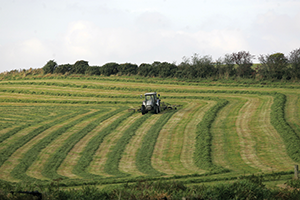Hogan sets out his priorities for the future
EU Agriculture Commissioner Phil Hogan outlines what he wants to achieve during his time in office.
Who said Phil Hogan was going to have an easy time of it as EU Agriculture Commissioner? Since taking up his new position in March of this year, the Kilkenny man has had to deal with the fall out of the Russian food ban, the crash in world dairy markets and the not inconsequential task of ensuring that the new CAP reform measures are implemented in a fair and equitable manner. Throw in the unending demands from Europe’s farm lobby groups and other stakeholder organisations and it’s a wonder that he has time to think about his priorities for the week ahead, never mind the next five years.
But it was significant that, from day one, Hogan committed to actively address a number of key issues which, he felt, went to the very core of the EU’s interaction with farmers. These include the simplification of the new CAP measures; the envisaged mid-term review of the now enacted Pillar 1 and Pillar support arrangements, the impact of volatility; and the need, as he sees it, to curtail the influence of the supermarkets within the agri-food supply chain.
The Agriculture Commissioner recently agreed to a question and answer session with eolas magazine in which he spelt out his priorities for the future.
What are your priorities re the proposed simplification of the CAP and when will these kick in?
I have made simplification of the CAP my top priority for my first year in office. My goal is to make work – and therefore life – more efficient and more productive for all players in the agri-food sector. At the beginning of this year we started an internal screening of the CAP and received over 800 pages of proposals from Member States, MEPs and stakeholders.
In the May council I already presented a set of six concrete actions which I intend to implement at the level of guidelines in 2015 for simplifying the system of direct payments to farmers, which do not require changing the EU Basic Act legislative rules. These involve changes which, for example, have simplified aspects of the Ecological Focus Areas, buffer strips and gaps between hedges for example. I am also pleased to report that I will be presenting a further package of simplification measures later this year.
This package will cover significant aspects of the direct payments system such as young farmers and coupled support, as well as changes to a number Delegated and Implementing Acts, notably in relation to simplifying the CMO [Common Market Organisation] legislation. This process will continue throughout 2015. We will keep the process open and listen to any suggestion which serves the goal of reducing burden and costs for our agri-food sector.
Do you intend taking specific measures to dampen the impact of volatility on farm gate prices?
European agriculture has now made the transformation to a market orientation. It’s a market oriented policy with the butter mountains and wine lakes a thing of the past. With a market focus, there is always the risk of volatility in prices at the farm gate. It is for this reason that we have specific measures in place to help stabilise farm revenues through direct payments to farmers, which amounts to approximately €42 billion.
Added to that, the Rural Development Programme helps producers increase the value of their product and get a better price. Market measures provide a safety net for producers in a time of crisis. Producers will get a better price when demand is increased through higher exports. I am leading a drive to increase the export success of EU agri-food products, which has grown 5 per cent in the past year, despite the Russian ban. I am doing this by more than tripling the promotion budget over the next three years to help producers find new markets and thus increase revenues at the farm gate. Finally, the new CAP encourages farmers to organise and jointly negotiate prices through producer organisations, strengthening their position in the food chain.
Should EU farmers carry the can for geo political decisions (EU:Russia) taken in Brussels?
I have stated on a number of occasions that farmers should not pay the price for a geopolitical decision not of their making. For that reason, I successfully averted activation of the Crisis Reserve in 2014, shortly after arriving in office, as this would have entailed farmers paying twice for the crisis.
The Commission has also introduced a number of temporary exceptional support measures in the dairy and fruit and vegetable sectors totalling €360 million to help producers affected by the closure of the Russian market.
Following the decision of Russia to extend the ban on certain European agricultural and food products, and as with all market situations, the Commission is and will continue to closely monitor the situation and will continue to review whether or not it is appropriate to respond with support measures.
We should note that, nine months after the start of the Russian ban, total EU agri-food exports to third countries increased by 5 per cent.
In addition, the EU has successfully managed to compensate for losses of export sales to Russia by increasing agri-food exports to several alternative export markets, including the US, China and other key Asian markets as well as Turkey.
Thus, the identification of alternative markets has helped to limit the economic impact of the Russian ban.
Do you still intend to appoint an EU supermarket ombudsman?
The European Commissioner for Internal Market, Industry, Entrepreneurship and SMEs is in charge of issues in relation to the food chain, such as unfair trading practices. There are examples of good practice in some member states, most notably Spain and the UK, which has recently introduced the Groceries Code Adjudicator.
Apart from ombudsmen or adjudicators, however, there are other ways to strengthen producers’ position in the food chain. Firstly, we are continuing to develop the Common Agricultural Policy in such a way that it helps make farmers more resilient. In particular, there is considerable financial support available for farmers who want to organise into producer groups, i.e. farmers who wish to band together in order to carry more weight vis-a-vis their trading partners, as I have already outlined.
But it is not only about money. If you look at the Common Market Organisation, you will see that there are actually numerous derogations from general competition law foreseen, precisely because this will allow farmers to organise themselves in a stronger way. And this is a very concrete and current policy dossier indeed – in fact the Commission is currently working on guidelines to make several such derogations easier to understand and thus to apply.
The second dimension to this issue concerns the fact that farmers (and also, of course, other players in the food chain) sometimes feel that their weak bargaining position results in unfair trading practices being applied to them by their partners.
Players on every link of the food supply chain have agreed that unfair practices such as unwritten contracts and sudden changes of terms should not exist.
This is why industry set up the Supply Chain Initiative, a self-regulatory regime aiming to achieve this exact goal.
But more work is needed. Not all parts of the supply chain feel that the Supply Chain Initiative is strong enough to guarantee progress, or enough progress. We would very much like to see this changing. We are confident that a supply chain whose representatives could agree what constitutes unfair trading practices could also agree on what constitutes a robust self-regulatory initiative to eradicate them.
In fact, I am sure that everyone who has joined the Supply Chain Initiative will confirm that unfair trading practices have no place in the way they do business. No company should have anything to fear from more stringent self-regulation. On the contrary, those who take the next step first will be applauded and ultimately, I believe, rewarded.
When will the mid-term review of the CAP commence?
There is a requirement under the terms of the 2013 CAP Reform to review the Ecological Focus Areas (EFAs) during 2016 and to present a report to the Parliament and Council of Ministers by March 2017. Of course, any changes to the EFAs would require changes to the Basic Act. At the same time, the simplification process may identify issues that could only be addressed by the reopening of the Basic Acts. If any such changes to the Basic Acts are proposed, these could be seen in the context of a Mid-Term Review.
Does Irish agriculture have a bright future? How will this manifest itself within the EU?
The future is bright for Irish agriculture in the EU. The EU offers a large market for Irish produce and with the negotiation of new trade opportunities, global markets will continue to grow for Irish quality produce.
There are 150 million people joining the global middle class every year and the global population will increase to over
9 billion by 2050. This is a huge opportunity for Irish and EU agriculture as, increasingly, these new middle classes crave Western diets.
In order to capture this prize, we need to elaborate a long-term strategy that encourages the agri-food sector to exploit emerging opportunities whilst minimising the costs of necessary adjustments. To exploit these opportunities the agricultural sector needs to have a clear focus in the longer term and the big picture. We need to build upon our successes of yesterday and today to build a strong and sustainable farm sector for tomorrow. But we also need to develop a strategy that will break with the weaknesses of the past. To achieve this, pursuing some clear long-term priorities will be crucial.
We need to consolidate agriculture’s market orientation and enhance its competitiveness and productivity; we need to equip farmers with the expertise and knowledge to address EU agriculture’s multiple challenges; we need to inject new vitality in rural areas by increasing the impact of agriculture’s direct and indirect links with the upstream and downstream food-related sectors, from inputs and food to tourism and research; we need to strengthen the sector’s role in the food chain in light of market concentration in the food processing and retail end; and we need to contribute to the renewal of agriculture by encouraging young farmers to get involved.







